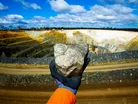Carbon mineralisation: ARCA expands global footprint

Arca, formerly known as Carbin Minerals, has announced it is working with nickel producers, a critical metal for the clean energy transition, to advance carbon dioxide removal at mine sites on three continents. Arca works globally with nickel mine developers and operators like Vale, Talon Metals, Poseidon Nickel, Nickel Search, and Blackstone Minerals to capture and permanently store CO2 in mine tailings using Arca's technology.
The company's patent-pending mineral activation technology uses high-intensity bursts of energy to transform and disrupt the mineral lattice structure of magnesium-rich minerals, increasing both the rate and capacity for CO2 capture and permanent storage.
Understanding the potential for carbon mineralisation
Professor Greg Dipple, co-founder and Head of Science at Arca, said, "Arca is helping mining companies understand the potential for mineralisation of their resources, design how that potential should be realized, and then advance to actual project development."
He added that Arca's mineral activation technology significantly accelerates the natural process of carbon mineralization using mine tailings from ultramafic rocks - helping these companies transform their tailings into industrial-scale direct air capture and storage facilities, transforming mine waste into a valuable new resource and climate solution.
Using material from its mining company partners, Arca has achieved never-before-seen rates of air capture and capacity for CO2 storage, operating at atmospheric air temperature and pressure. Todd M. Malan, Head of Climate Strategy at Talon Metals, said in the statement that "Talon and Arca are working on transformational change in mining and mineral processing to showing how 'waste' from conventional nickel processing can be harnessed to store carbon that has been removed from the atmosphere or captured in industrial processes.
"This 'waste-as-carbon-sink' approach has further potential for reuse in building materials, thus significantly reducing the amount of waste that needs to be stored compared to present-day legacy nickel processing."
What is carbon mineralisation, and how does it work?
Carbon mineralisation is using naturally occurring minerals found in rock to convert greenhouse gases, such as carbon dioxide (CO2), into valuable minerals. In this process, CO2 is mixed with a silicate compound and heated to high temperatures, forming solid minerals. We can then further process these minerals and sell back to the market for reuse.
The process does not require additional energy input, making it an attractive option for companies looking to reduce their environmental impact and increase profitability. Carbon mineralisation has several benefits, which enable companies to reduce their emissions, resulting in cleaner air and a healthier environment, while also using it to create valuable minerals from mine waste that would otherwise have been discarded. This not only reduces pollution but also increases the profitability of mining operations.
Lowercarbon Capital and the Grantham Foundation, the leading climate investors in the rapidly emerging carbon dioxide removals industry, backs Arca. “With Arca, mining companies can turn tailings liabilities into assets by unlocking gigaton-scale carbon removal,” said Ryan Orbuch, Partner at Lowercarbon Capital.
